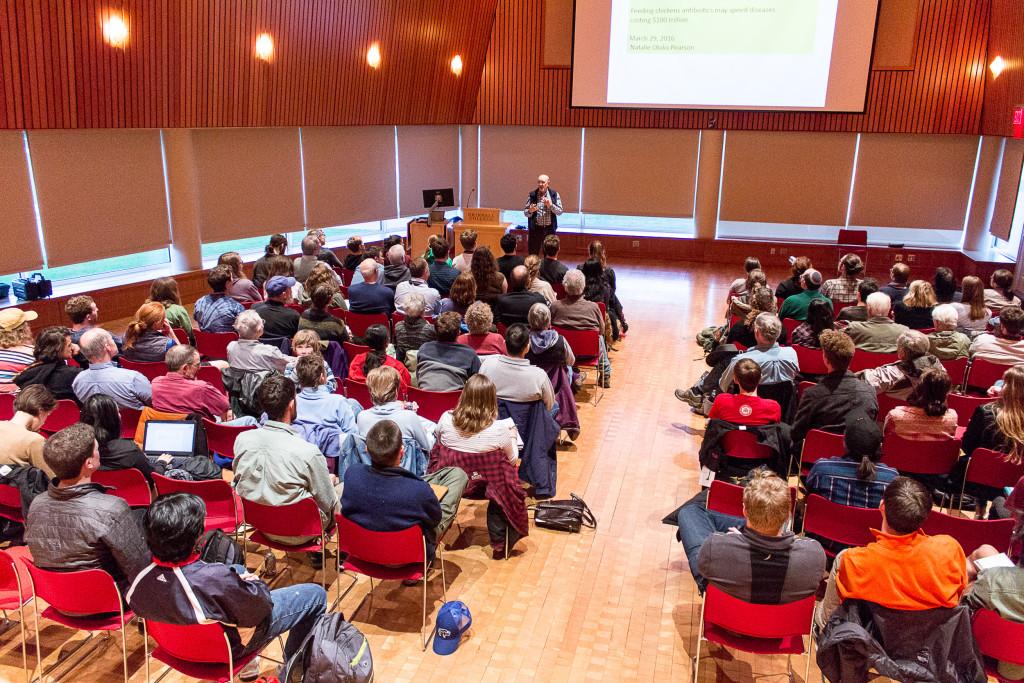Michael Cummings, Community Editor
cummings@grinnell.edu
Keeping true to its status as a liberal bastion among the cornfields, the College hosted a talk entitled Capitalism and Agriculture presented by Emeritus Professor of Plant and Soil Science Fred Magdoff of the University of Vermont. The talk, which took place on Monday night in JRC 101 and was sponsored by the Center for Prairie Studies, was a broad survey of the capitalist system with special emphasis on agriculture.
Magdoff was introduced by Vincent Kelley ’16, a student member of the Center for Prairies Studies Committee. Kelley spoke of how he has wanted to bring Magdoff to campus for two years, following an email exchange between the two.
“I actually had been hoping to bring Professor Magdoff for two years now,” Kelley said, recalling a time two years ago when he had emailed Magdoff asking for a reading list on ecology. Magdoff had given a very thorough response, inspiring Kelley to take steps to bring him to campus.
Magdoff began by addressing the history of capitalism. In particular, he addressed the unfortunate truth of the historical tie between capitalism and slavery in the United States.
“I think it’s relatively little-understood how important slavery in the United States … was for the development of industrial agriculture,” Magdoff said, asserting that for a time in America’s history, capitalism and slavery were synonymous.
The talk continued with a definition of capitalism. According to Magdoff, the tradition of capitalism as a free market economic system is flawed.
“That is no definition of capitalism,” Magdoff said. “There were markets before capitalism, there will probably be markets after capitalism. That doesn’t define capitalism.”
Instead, Magdoff offered his own definition — symbolized as M-C-M-prime. The first M stands for money, used to purchase raw materials, machinery and labor. The C stands for the commodity produced following these purchases, and M-prime stands for the greater sum of money that results from sales of the commodity.
Magdoff explained that this model of capitalism shows that there are no limits to the constant attempts to make more money — the next step is M prime -C-M- double prime, followed by M-double-prime-C-M-triple-prime, etc.
“There’s no such thing as enough in capitalism,” Magdoff said.

This is exemplified by a strange trend in agriculture where farmers will want to produce more regardless of how prices are trending.
“When prices go down, farmers produce more. When prices go up, farmers produce more,” Magdoff said to laughs from the audience.
Magdoff went on to explain how capitalism forces farmers to make decisions that harm the environment in which they work.
“[The production of] corn and soybeans makes economic sense given the infrastructure,” Magdoff said. “But corn and soybeans is a particularly lousy system from an ecological point of view. It leaves the soil bare for a long period of time. It is not a real rotation … it makes farmers dependent on fertilizers and pesticides.”
The reason why the corn and soybean model is such a prevalent farming model, Magdoff says, is simple:
“[It’s] easy to grow, easy to sell, easy to mechanize,” he said.
Magdoff summed up his talk with a broad analysis of the agricultural decisions made in a capitalist system.
“From every point of view I can think of … the systems that have developed here … are literally irrational from a social point of view, and irrational from an ecological point of view. And they only make sense in the context of a system which is based on profit,” Magdoff said.
“There’s no bad people here involved, there are people here just trying to get by.”
In his conclusion, Magdoff called for the establishment of a system other than the capitalist one.
“In my mind the remedy is a different system, a different economic system that has as its very basic purpose for being to produce things — food, other goods, for people to use, not to sell in a market to make a profit.”





























































